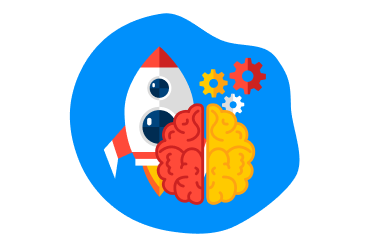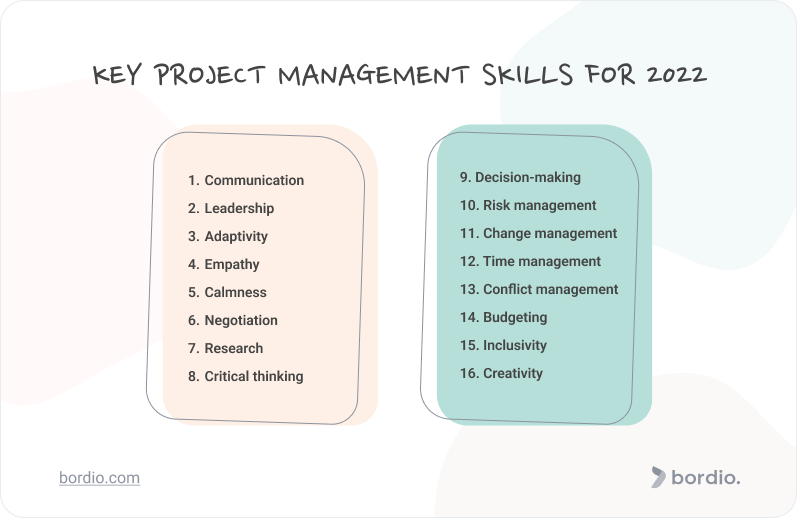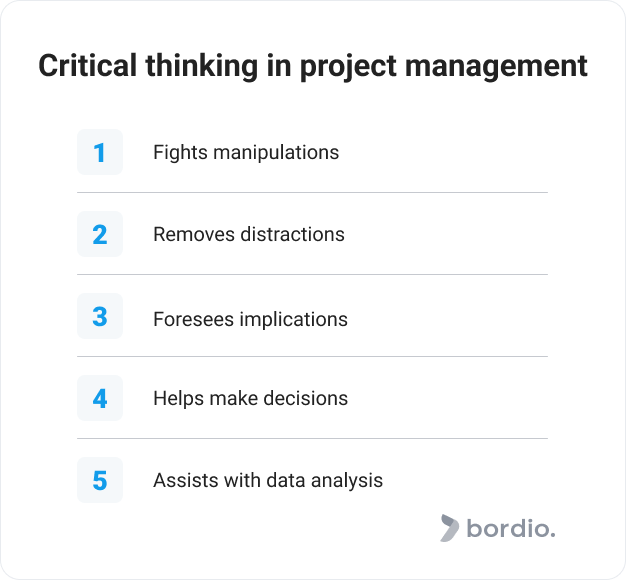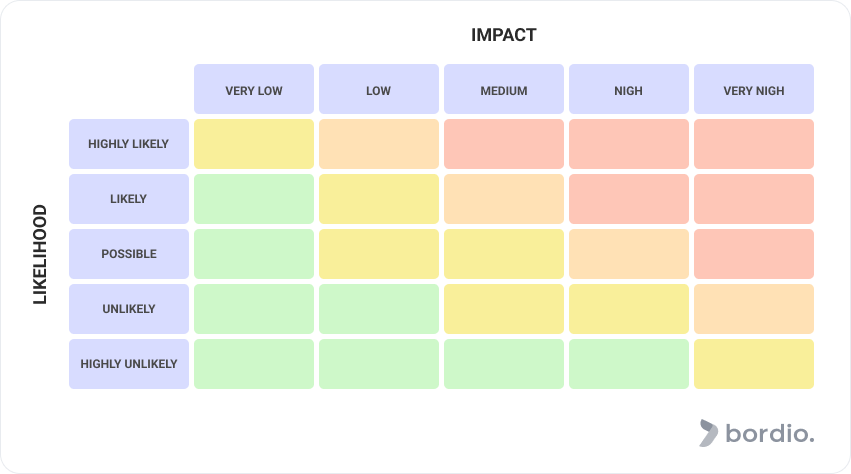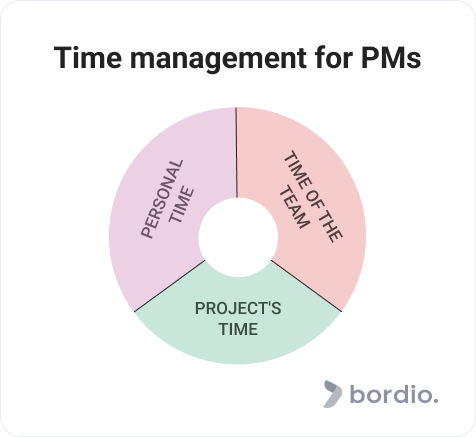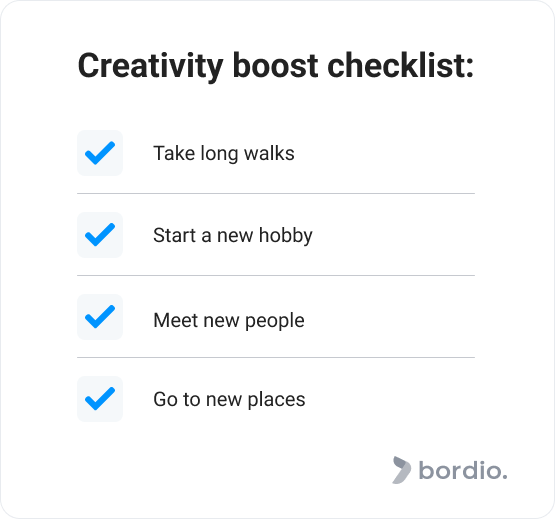Want to become a project manager? Or maybe you are already a PM and now looking for ways to upscale your knowledge and opportunities?
In both cases, you will require skills to get you somewhere.
But with so many things to learn and concepts to adopt, how does one know what skills are essential and relevant in 2024, 2025 and onwards?
We are here to help! The Bordio team has searched far and wide, looked back at our own experience in project management, analyzed the web, and listened to what other professionals have to say about it. The result of our work is in front of you – the list of most sought-after project management skills that you absolutely need to possess to succeed in the field.
Top project management skills everyone must develop
Let’s dive into the essential project management skills that every project manager needs now and moving forward.
Ps – for more theory and insight on project management, check our list of best project management books with some of the top works that have helped millions of project managers worldwide.
#1 Communication skills
We know, not very ground-breaking. But just like with dieting and exercises, we all know we should do it to be healthy and toned up, however only a few really take it into consideration and follow through.
Same with communication – we often know the right thing to do but the old habits get the best of us.
A good project manager is almost like a diplomat. They must understand everyone’s roles and perspectives, and handle negotiations and conflicts.
How to develop communication skills
Effective communication is not about listening, it’s about hearing what somebody is trying to tell you.
Learn to be an attentive listener: don’t multi-task or dream about something else while you’re having a conversation. Many projects fail because all stakeholders only want to push their agenda but are not interested in hearing what others have to say.
But communication skills do not only mean listening to others speak. It’s also about speaking up when necessary and sharing your feedback.
A successful project manager also knows how to streamline communication channels to ensure that everyone in the project team gets the information they need on time and in a convenient format. If you’re not sure how to build an efficient system, create a communications plan to guarantee nothing gets missed in the swing of things.
#2 Leadership
Leadership is a tricky one. How does one become a leader? Or an inspirational one? It’s something that is hard to track and measure, yet we instantly know a good leader when we see one.
Leaders are followed, but managers are tolerated.
How to develop the leadership skill
There are as many ways to develop leadership skills as there are leaders.
Here’s what we can recommend:
- Learn to make hard decisions and put others first.
- Learn to take responsibility for yourself, your actions, and your team.
- Find inspirational leaders and learn about their journeys. Look for interviews on YouTube, TED talks, and books where they share their experiences and hardships that helped them become who they are today.
- Find an inspiring mentor and ask them for guidance.
Leadership is not easy, especially when your team members are spread across the city, country, or globe. We’ve written a separate expert guide on managing remote teams, so make sure to read it if you’re managing a hybrid or remote team. We can also recommend you to use remote collaboration tools to handle the process.
#3 Adaptivity
Change is good, and change is well.
Nothing is set in stone these days, really. Circumstances change, so do our plans, and we, ultimately, need to follow.
Being able to adapt means thinking and reacting quickly, seeing the positive in the change, and being creative and open-minded. It also includes a forever-student attitude, where the project manager is eager to learn new things, be it a new project management software, the latest hottest methodology, a new niche or industry where the company is investing in, or anything else.
How to develop adaptivity
Start small. If your first instinct to change is to object to it, force yourself to analyze it and see how it can turn out for the better.
Practice project management frameworks that encourage and support flexibility and change. Agile, Scrum, and Lean will help you see that adapting is not necessarily hard and painful, and that change is not a villain.
And to remain objective, have a peek into PRINCE2 and Waterfall to understand those less flexible frameworks better. They have their strong sides too, and, for some projects, they turn out much better than trendy methodologies.
#4 Empathy
Project management is pretty much people management.
And it’s much better to deal with a large number of people in a stressful environment when you can sympathize with them. Empathy helps avoid conflicts and find a personal approach to stakeholders and team members. Together, that makes the project stronger and less likely to fail or become mediocre.
How to develop empathy
Some people are more empathetic by nature than others.
But don’t worry if you don’t think you are among the lucky ones. To become more empathetic, start building personal connections with the team and practice self-reflection.
Make an effort to not jump to conclusions but take a step back and see why someone did or said something.
An interesting life hack that we’ve found is to read more fiction books. You should, of course, look for great team management and psychology books too, but it is believed that living through those fictional characters’ lives helps us grow and learn to understand the perspectives of someone very different from us.
#5 Calmness
Call us biased, but calmness is an essential project management skill for any project manager who wants to build a successful long-term career.
There’s nothing more damaging to the project and irritating to the team than a project manager who gets fired up over nothing (or something) and lashes out at everyone around, or panics and makes short-sighted decisions that damage the project in the end. To have more peace of mind during the project and to control time you can use software for work management.
Calmness helps deal with stress and fast-paced environments, it makes you a better listener, colleague, and manager.
How to develop calmness
If you are open to meditation – great! We would highly recommend it as a tool to learn to focus and stay grounded.
Another good way of staying calm is through regular exercising. We’ve briefly talked about the power of exercising in our how to be productive at home article. But we’ll say it again – doing a workout, even if it’s only 10-15 minutes, can do wonders to your mind and soul. Not only will you be more healthy but you’ll be able to re-charge and release all the negative energy and tension. Many successful project managers and other professionals schedule workouts in their weekly planners at least a few times a week. You should try it too! By the way, you can use free task maker with reminder notifications for convenience.
#6 Negotiation
Negotiation is all about finding the middle ground and coming to a compromise that satisfies everyone.
Project managers negotiate all the time: project planning, talking with suppliers, dealing with a grumpy team member, and demanding stakeholders. Finding win-win solutions through negotiations is a necessity in a project manager’s job.
How to develop the negotiation skills
Put yourself in situations where negotiation is needed. Ask to participate in meetings and watch others. Read between the lines and analyze why someone succeeded and others did not.
When you are discussing feature ideas, project budget, or anything else – use this opportunity to negotiate better conditions for you. Now, we don’t encourage you to argue with anything that comes your way, but a little bit of going back and forth will not hurt. Plus, you will probably get more than you could have hoped for initially if you don’t just agree with the first offer you get.
#7 Research
Research skills help the project manager make their project successful.
Best project managers are not experts in everything but they know how to google and where to look for information.
Some of the examples of what project managers research for the project:
- Market potential: what clients are asking about, what competition offers, recent trends.
- Best suppliers who can deliver top products in the shortest time for the project.
- Any technical stuff that team members are working on and the project manager needs to supervise.
Tip: One thing you don’t need to research is a great online calendar planner because we have it ready for you! Also check out Bordio’s other projects such as time organizer app and online electronic planner.
How to develop research skills
Ask around – if you work with a colleague who can find anything, then don’t be shy to ask them how they do it. Listen to their advice and practice it right away.
Another route would be to take a research course but be careful as many of them go into deep scientific methods that might be beyond what an effective project manager needs. You can look for specialized learning opportunities in project management. Perhaps the most well-known in the field would be the Project Management Institute (PMI).
#8 Critical thinking
If it was up to us, critical thinking would be a taught discipline in schools!
Critical thinking is one of the most important project management skills because:
- It helps withstand manipulations and distractions.
- It allows for making quick decisions within constrained circumstances.
- It helps us foresee the implications of our actions and decisions.
- Makes the data analysis process easier.
Becoming a critical thinker can seem somewhat tiring as it basically means questioning everything. However, in project management, where risks are all around you, being slightly paranoid is a true virtue. Well, to not get into situations where you need to urgently think of something fast, should use planning tools like online planner and task organizer.
How to develop critical thinking skills
There are countless courses, books, and guides that you can find online that will teach you the basic theory behind critical thinking.
As a quick exercise, anytime you get new information don’t accept it by default. Take the time to understand it, do a quick research of your own, and only then make your own informed decision.
With sensitive or emotional data that is often used to manipulate us, look for alternative sources and what they’re saying. It’s a bad sign if you only have one source claiming something, and everyone else is silent. Also, consider if the source sharing the information is benefitting from it. For example, it often happens with the news in autocratic countries, where people’s opinions and minds are shaped into whatever form the government requires. A quick google can show that the latest sensation is rather exaggerated.
#9 Decision-making
The next project management skill that everyone needs in 2025 is strong decision-making.
The project management team expects us to make informed and data-driven decisions that consider multiple factors, decisions that are prompt and benefit the well-being of the project.
How to develop the decision-making skill
Decision-making is a skill that some people master as they go along. But there is a danger in such a route – a project manager can make too many mistakes and lose their career.
An experienced mentor will be able to help and guide you in the right direction.
A good starting point would be to learn to act quickly but not rushed. Always take the time to analyze the data before making a decision but don’t drag it for too long, risking losing the momentum.
#10 Risk management
Risk management skill is a combination of being able to analyze the current environment, forecast trends, come up with solutions to minimize possible damage, and make decisions quickly under pressure.
It’s not enough for the project manager to identify risks during the project planning stage. Threats can occur later down the line, so it is important to stay alert and always scan for potential risks.
How to develop the skill
Much like everything else in project management, the ability to identify and mitigate risks comes with experience. But only to a certain extent. A lot of the risk management skills can be trained and learned through exercises. It comes down to analytical thinking, learning to look at the situation from multiple angles, and calculating the possible consequences. So any aspiring or practicing project manager can make an effort to look at the project and ask themselves what can go wrong and when.
It would also help to study different takes on risk management and the instruments to work with it. As a starting point, you can read through our risk assessment matrix guide.
The matrix is one of the widespread risk management tools because it is simple yet to the point, and doesn’t take much time to learn how to use it.
#11 Change management
The last two years of the pandemic felt like a one big hardcore change management boot camp. Now everyone understand how important being able to work in a changing environment is. But it’s not enough to be open to change yourself, it’s also important to lead the project through changes.
How to develop the skill
To ace change management, one should learn to be open to change, to not see it as a threat but as an opportunity. It also takes a quick-thinking process to be able to analyze the change, see how it affects the current situation, and what can be done to make the most of it.
Work on your mindset and use real-life opportunities to master the skill.
#12 Time management
If you manage your time poorly, in most cases your team will do the same.
The project success is a fragile substance. It depends on many factors, including luck, and there is no guarantee of success, even if you do everything right.
Among many other soft skills that help manage projects, time management is a really important project management skill. If you know your way with time and can plan correctly, you will be able to deal with many other issues that often come up in project management.
For project managers, time management consists of 3 pieces of a pie:
- Their own time management.
- Time management of the team.
- Project’s time management.
How to develop time management skills
Time management is something we learn and practice all our lives.
Sometimes we are better with time, sometimes we lose track of it. Learn to accept it and not beat yourself up too much. But also learn to understand your strong sides and find the optimal way to save the situation when the time is slipping away.
In terms of getting better with time, we recommend checking out our Best Time Management Books guide for invaluable tips, tricks, and more.
And what we’ve found to help a lot with time management at Bordio is using an online daily planner that PMs and team members alike can refer to and track how well they’re doing. Online planner is with you 24/7, so you can stay on top of tasks even when you’re away from your desk.
#13 Conflict management
Conflicts are toxic in personal life, and they are super harmful in the professional field.
In project management, conflicts create additional risks and delays, causing the project’s progress to slow down. Naturally, any project manager is expected to be able to handle conflicts in their team and with project stakeholders.
How to develop the skill
Resolving a conflict is not always easy, but a good starting point would be to listen to every party before making decisions or jumping to conclusions. A project manager should be able to face the situation, hear what everyone has to say, and offer a solution. It’s almost like negotiating, but when it goes terribly wrong.
Unfortunately, different team members and project stakeholders will be fighting. It’s human nature that is hard to beat.
So, when the inevitable comes, and you are faced with a conflict, the best tip we can give you is to not sweep it under the rug but address it immediately (and, ideally, in private). Have patience and empathy for everyone involved, and remind them that we are all on the same page and focus on the same goals. Then start getting to the root cause of the issue.
You will learn through practice faster than any theory can teach you, but it would make sense to look for what the classics tell us about conflicts. You will find chapters on conflict resolution in all major project management books out there.
#14 Budgeting
Budgeting or cost management is another critical skill for project managers.
Nobody expects a PM to be a financial or accounting expert but they must be able to deal with the project budget and make it work. There are two main scenarios where budget management skills will be required:
- A project manager is given a ready budget for the project.
- A project manager must do a cost estimate and have it approved by key stakeholders.
Even if the project manager has helped with the budget, it is still paramount for them to have a basic understanding of the concept. The project budget is a part of the iron triangle which consists of costs, time, and scope. It is the project manager who works with the triangle and ensures the estimations, and, therefore, the project plan makes sense.
How to develop the skill
It’s a tricky one. You can learn basic budgeting from personal management finance and apply key principles to the projects. However, it’s likely not enough with complex projects.
If you are already working as a project manager but are not actively involved in budgeting yet, ask to be included in the process. As you sit and watch colleagues do the magic, ask them clarifying questions and write down the key points.
If you are serious about it, there are many short and long-term courses focused on budgeting that you can take. But be prepared for a steep price and long hours that you will be required to spend crunching numbers. So be wary of your schedule and make sure there’s enough time you can allocate to it.
#15 Inclusivity
Inclusivity, or rather inclusive thinking, is one of the soft skills that have recently become more relevant in project management.
Society is changing, and it’s important to accept and welcome people of all backgrounds and profiles. Clearly, a diverse group of people will come up with more breakthrough and innovative ideas than a team of similar-looking and thinking professionals.
Inclusivity allows for different perspectives to be heard, making the solutions that the project team is working on better because it caters to different demographic and it does it in a smart and considerate way.
How to develop inclusivity
Inclusivity is part of emotional intelligence. Developing it takes a lot of deep work with yourself. Do a little self-reflection session to see if you have any bias against some demographics. It’s important to be raw and honest with yourself if you want to progress with it.
Also, you might speak with your HR to see if they can guide you in the right direction. A lot of workplaces today have special programs or access to more information. They will be happy to point you in the right direction.
#16 Creativity
Creativity today is a vital quality for building a successful career. But it’s not just a buzzword.
In the crazy, hectic world of today being able to generate creative ideas is what differentiates a great project manager from an average one. And creativity is not an easy one to automate or teach to AI. So if we are talking about long-term careers in project management, it makes a lot of sense to invest time and effort into building your creative muscle.
How to develop creativity
Nobody has a ready formula that tells you what to do to become creative.
However, one of the proven ways to boost your creative flow is to change up your routine:
- Start going on long walks if you tend to spend the majority of your time at home.
- Try a new hobby that’s outside of your comfort zone.
- Meet new people and hang out with them. Ideally, look for new friends who are not in the same working field as you are and don’t live a similar lifestyle.
- Go out more often. We get inspired and creative when we are surrounded by something new. Go to a neighboring city or visit a local museum and a concert hall.
Final thoughts on key project management skills
The list of project management skills can seem daunting, especially if you are only starting in the field.
However, many of the things we talked about will come to you naturally, as a part of the working process, if you are willing to stay open-minded and soak up all the knowledge surrounding you.
Even the top project managers with vast experience behind their backs may struggle with some skills on the list. And that’s okay. Project management is growing and evolving constantly, and so do you. Stay active, learn to listen, use time managers, be curious, use powerful online to-do lists, and you will be fine.
